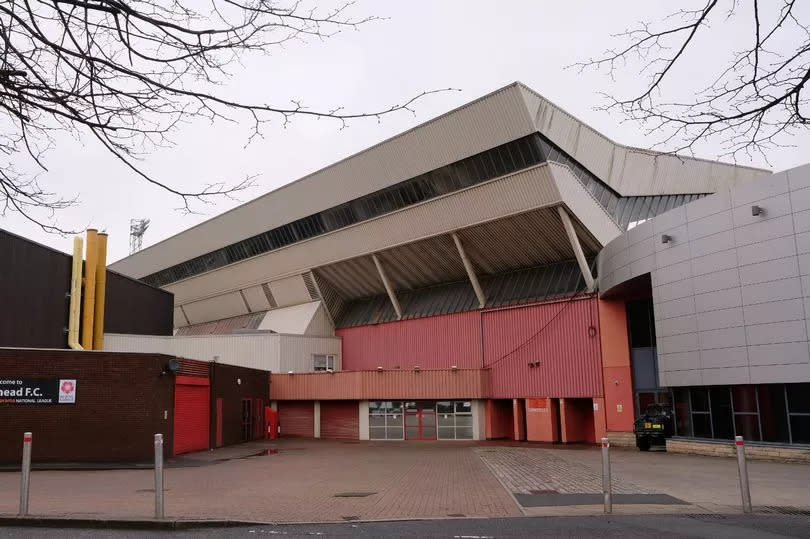Why Gateshead Council wants the International Stadium off the books – and its next move explained

The uncertain future of Gateshead International Stadium has been put under the spotlight this week following an outcry over Gateshead FC being barred from the National League play-offs.
Heed fans have been left devastated this week after their team was deemed ineligible for promotion to the English Football League (EFL) as the club could not meet a requirement to secure a 10-year lease on their ground, which is owned and run by Gateshead Council. This week’s drama marks the latest development in a cost-cutting saga over Gateshead’s leisure services that has been a source of major controversy over the last 18 months.
Two leisure centres elsewhere in the town have already been closed down and the future of the stadium, as well as Gateshead’s other remaining public sports facilities, remains unclear for the moment. Below is the key information you need to know about how the situation reached this point and what the future is likely to hold.
Read More: Gateshead FC fans stage council protest over 'sickening' decision to block club from play-offs
Keep up to date with all the latest local news from Newcastle with our free newsletter
Why is the stadium’s future unclear?
Put simply, the Labour-run council says it can no longer afford to run the stadium and its other leisure centres at a time when it is facing a £50 million budget shortfall over the next five years and escalating social care costs. Gateshead Leisure Centre and Birtley’s swimming pool were shut down last summer for the same reason, while the stadium is among the remaining leisure sites across the town that the council is seeking to contract out to a private operator.
The council had set out in 2015 to make its leisure services self-sustaining by 2020, but failed to achieve this and in fact saw deficits widen significantly as Covid-19 and the cost of living crisis hit. Critics have accused the council of not acting quickly enough to secure the future of its leisure centres and allowing the situation to deteriorate, particularly at a time when other North East authorities like Northumberland have been building new leisure centres.
Figures obtained by the Local Democracy Reporting Service show that subsidising Gateshead International Stadium has cost the council £4.2 million over the last five years, including £913,000 in 2023/24, which civic centre bosses argue is unsustainable amid a backdrop of continuing cuts that have already seen them slash £191 million since 2010.
The council has cautioned that the stadium is in need of £4 million of repairs over the next decade and, with operating costs added to that, it will cost the council at least £11 million to keep open in that time. A report to the authority’s cabinet last year warned that there is “no current funding source that the council may access to meet this potential liability” and that the authority “would experience financial difficulties in retaining any offer” at the stadium.

When will a new operator be in place – and will there definitely be one?
The council launched a procurement exercise in February to find an external operator to take over the borough’s remaining leisure sites in Blaydon, Heworth, and Dunston, with the option of them taking over the stadium as well. Two lots have been put out to tender, one which includes the stadium and one which does not.
A decision to appoint a contractor is expected to be brought back to the cabinet this September, with that new operator expected to be handed the keys to the centres by February 2025 at the latest. While it is not known who will be bidding, sources have told the Local Democracy Reporting Service that the council has held talks with companies with experience of running both leisure centres and stadiums.
There is a confidence within the civic centre that the commercial opportunities presented by the stadium will make it attractive to leisure firms interested in bidding. But there is no guarantee at this stage that a new operator will definitely be found and it is that uncertainty that has been a problem for the EFL.
Will a new operator of the leisure centre be obliged to keep Gateshead FC as a tenant?
Gateshead Council says it agreed to give the football club a 10-year licence at the stadium if they gained promotion – but, crucially, this would have included a break clause whereby the club would negotiate new terms if the operation of the stadium does indeed transfer to a new operator, as it is expected to. The Local Democracy Reporting Service understands that the council has not offered to make it a condition of any future leisure operator’s contract that Gateshead FC must be retained as a tenant.
A source indicated that the council’s expectation is that any future operator would want to retain the football club’s presence, given its importance to the community and its potential to generate significant revenue for the venue. The EFL is known to have wanted a more formal and legally binding agreement to satisfy its condition that clubs gaining promotion from the National League must have 10 years’ security on a stadium.
Is the stadium at risk of closure?
The prospect of closing the stadium came up in late 2022 when it first emerged that some leisure centres were at risk of being shut down. Gateshead Council excluded the stadium from the sites put at risk, on the basis that it was a unique asset built to host international events and having a “wider and significantly different offer” to the town’s other facilities.
But the GMB union argued that the stadium needed to be considered for closure too, calling it a “white elephant” that was of less benefit to local residents’ health and wellbeing and was “being allowed to plod on indefinitely whilst vital services will be decimated”.
While the council’s view on the importance of the stadium is unchanged, the appointment of a private operator will be key to its future. If the council fails to find an operator, there will be major doubts over how long it could continue to run the stadium itself – hence why it has been unable to offer a cast-iron guarantee to the EFL.

 Yahoo News
Yahoo News 
